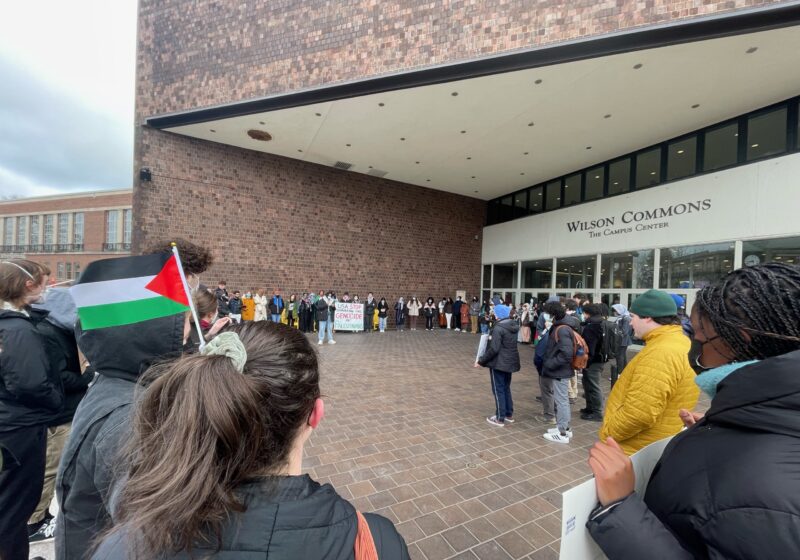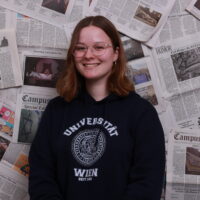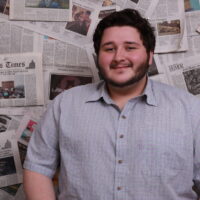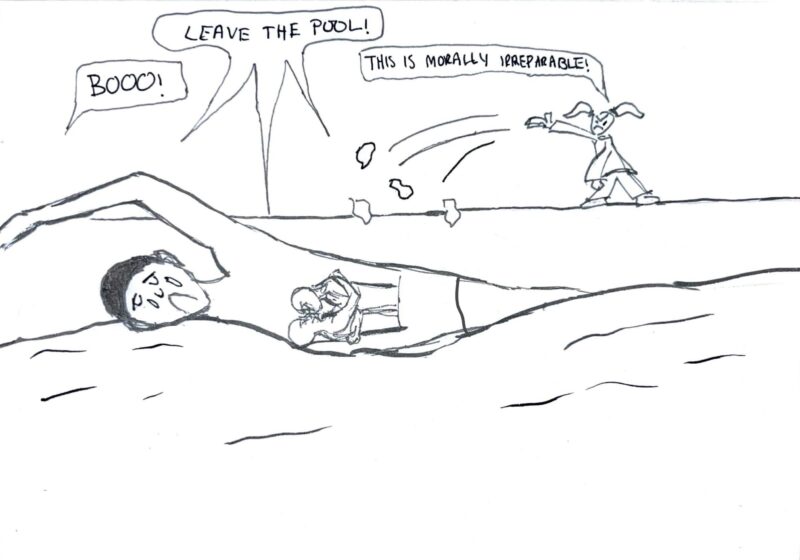Students for Justice in Palestine (SJP) held their first protest of the semester outside Hirst Lounge on Saturday. Around 60 people showed up to rally against the war in Gaza.
“Free, free Palestine.” The chant, led by a student moderator, rang throughout Wilson Quad, kicking off the protest. Attendees waved Palestinian flags and raised handwritten posters in support of the Palestinian cause.
Around them was a semicircle of Wilson Commons Student Activities (WCSA) staff and student volunteers donning bright yellow tags identifying them as “event monitors.” The protest was registered in advance to take place from 3-4:30 p.m., according to Interim Dean of Students Anne-Marie Algier
After a prayer for the lives lost and a moment of silence, the rally proceeded with eight speakers from varying backgrounds, who each spoke in opposition to the war and U.S. assistance towards it, with a particular focus on the University administration’s lack of support for a ceasefire and divestment from Israel.
The first speaker, a student from Nazareth University, began with the definition of genocide and said what is happening in Palestine meets the criteria. She said the claim that a humanitarian crisis is occurring is completely wrong.
“The last time I checked, a humanitarian crisis didn’t look like Israeli soldiers rampaging into a hospital dressed as Palestinians with military weapons killing three little girls,” she said. “It didn’t look like every single hospital being bombed along with schools and places of worship, along with innocent people.”
The next speaker was a member of the Rochester Voices for Palestine community organization. She listed the ten stages of genocide, highlighting similarities between them and Israel’s conduct in Palestine. She also asserted that it is everyone’s responsibility to hold their leaders and institutions accountable.
Chants framed all of the speaker’s calls. “Gaza, Gaza, don’t you cry, we will never let you die,” the crowd yelled.
At this point in the protest, the wind was blowing cold air on attendees who had already been outside for over thirty minutes. The moderator noted it was the same temperature in Gaza, but they did not have clothes or electricity to stay warm. “Just keep that in mind,” he said.
The third speaker was alumnus Mahmoud Tarifi ‘23. He explained that the reason they resist and protest is to tell their children that they did everything they could during the Gaza genocide. He noted that a large majority of schools in Gaza have been destroyed, and he voiced his disgust that UR supports the “apartheid government of Israel,” as he put it, that directly attacks education and educators.
“Speak now or forever hold your shame and guilt,” Tarifi stated.
The following speaker was a Jewish student from the University, who declined to be named in the Campus Times. He stated that, as a member of the Jewish faith, it was heartbreaking to see atrocities happening in the name of Jewish people and that Jews have a duty, as survivors of genocide, to ensure that it does not happen to anyone else. He also spoke out against the University’s actions.
“They have many times said that they are doing this to protect Jewish students on campus, I came here today to tell you all and the University that we do not want this,” he stated.
The next speaker was another student from the University who did not prepare a speech. She said Israel is destroying Palestinian culture and that we are failing to acknowledge that culture because all everyone sees is Palestinian suffering.
Another chant broke out: “Hey hey, ho ho, Zionism has got to go.”
The sixth speaker at the protest was alumnus Elvis Vasquez ‘23. He talked about how attending the protest meant that you care about the liberation of Palestine and all oppressed peoples. He said the UR administration doesn’t understand that the systems that justify Islamophobia and antisemitism are the same.
He additionally encouraged protesting on campus by listing instances in which protests were successful, like when students prevented the arming of Public Safety officers on the River Campus.
“Those that come after you will uphold your legacy,” he said. “Don’t lose faith because the younger one[s] are watching you organize, while those that came before you are looking at you with pride.”
“1, 2, 3, 4 — Occupation no more,” the crowd chanted.
At this point, the protest moved in an orderly fashion from outside Wilson Commons to Wallis Hall. The crowd shouted the whole way there, and some passing cars honked in support.
“5, 6, 7, 8 — Israel is a terrorist state,” they yelled.
At Wallis, the moderator and a few students holding a large Palestinian flag stood in front of the building. All other protesters were instructed to stand on the grass behind the sidewalk, as that is city property, not University property.
The final speaker of the protest was the moderator, who shared a story about his cousin Tofiq, a 17-year-old American who he said was killed in Palestine by Israeli snipers for throwing stones. The moderator explained that every day they protest, innocent lives are becoming statistics.
Students and their family members are directly impacted by what is happening, he said, and the University needs to take a stand. He stated that calling for a ceasefire will not change the situation in Palestine, but it would put the University on the right side of history.
“Does your job mean more than our lives?” he asked.






